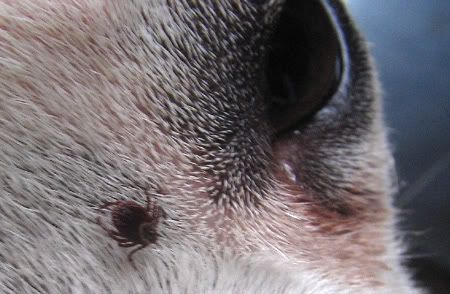365 Urban Species. #146: American Dog TIck

Urban species #146: American dog tick Dermacentor variabilis
Also called the wood tick, this is the largest and most common tick in Eastern North America. Unlike the deer tick, it doesn't carry Lyme disease, but can transmit other diseases, including Rocky Mountain spotted fever. It becomes active in April and May, climbing to the tops of weeds waiting for a mammal to come by and serve as a host. Baby dog ticks feed on small mammals like mice and rats, move to larger mammals as they grow, such as skunks and raccoons. They are "three host" ticks, and the third host is likely to be a domestic dog, or even a large urban primate.

We collected this bottle full of ticks (deer and dog both) from the dogs, at the end of a July visit to (appropriately enough) Dogtown.